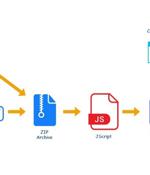Security News

A new QBot malware campaign is leveraging hijacked business correspondence to trick unsuspecting victims into installing the malware, new findings from Kaspersky reveal. QBot is a banking trojan that's known to be active since at least 2007.

An emerging Android banking trojan dubbed Nexus has already been adopted by several threat actors to target 450 financial applications and conduct fraud. "Nexus provides all the main features to perform ATO attacks against banking portals and cryptocurrency services, such as credentials stealing and SMS interception."

Their advanced algorithm can identify discrepancies by comparing chip blueprints with electron microscope images of the actual chips. The research team has generously made available all chip images, design data, and analysis algorithms online at no cost, enabling fellow researchers to access and utilize these resources for their own investigations and advancements in the field.

A banking trojan dubbed Mispadu has been linked to multiple spam campaigns targeting countries like Bolivia, Chile, Mexico, Peru, and Portugal with the goal of stealing credentials and delivering other payloads. "One of their main strategies is to compromise legitimate websites, searching for vulnerable versions of WordPress, to turn them into their command-and-control server to spread malware from there, filtering out countries they do not wish to infect, dropping different type of malware based on the country being infected," researchers Fernando García and Dan Regalado said.

A Croatian national has been arrested for allegedly operating NetWire, a Remote Access Trojan marketed on cybercrime forums since 2012 as a stealthy way to spy on infected systems and siphon passwords.The arrest coincided with a seizure of the NetWire sales website by the U.S. Federal Bureau of Investigation.

A new variant of the Android banking trojan named Xenomorph has surfaced in the wild, the latest findings from ThreatFabric reveal. "This new version of the malware adds many new capabilities to an already feature-rich Android banker, most notably the introduction of a very extensive runtime engine powered by Accessibility services, which is used by actors to implement a complete ATS framework," the Dutch security firm said in a report shared with The Hacker News.

A malicious Python package uploaded to the Python Package Index has been found to contain a fully-featured information stealer and remote access trojan. The package, named colourfool, was identified by Kroll's Cyber Threat Intelligence team, with the company calling the malware Colour-Blind.

The PlugX remote access trojan has been observed masquerading as an open source Windows debugger tool called x64dbg in an attempt to circumvent security protections and gain control of a target system. "This file is a legitimate open-source debugger tool for Windows that is generally used to examine kernel-mode and user-mode code, crash dumps, or CPU registers," Trend Micro researchers Buddy Tancio, Jed Valderama, and Catherine Loveria said in a report published last week.

A new Android banking trojan has set its eyes on Brazilian financial institutions to commit fraud by leveraging the PIX payments platform. "PixPirate belongs to the newest generation of Android banking trojan, as it can perform ATS, enabling attackers to automate the insertion of a malicious money transfer over the Instant Payment platform Pix, adopted by multiple Brazilian banks," researchers Francesco Iubatti and Alessandro Strino said.

An ongoing campaign dubbed Earth Bogle is leveraging geopolitical-themed lures to deliver the NjRAT remote access trojan to victims across the Middle East and North Africa. "The threat actor uses public cloud storage services such as files[.]fm and failiem[.]lv to host malware, while compromised web servers distribute NjRAT," Trend Micro said in a report published Wednesday.